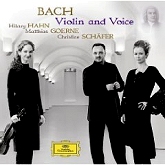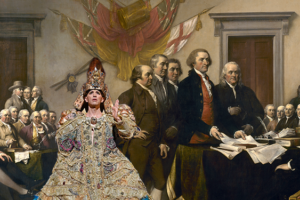
Some composers write as if the dividing line between instruments that play notes and the voice, which usually sings a text and takes some of its attitude towards the music from that text, were not an all-important factor.
Though the sacred texts that make up the great majority of the words Bach set to music had very deep meaning for him, the melodies to which he set them had themselves a spiritual meaning for him inseparable from the message conveyed with the words.
Accordingly, where a voice was accompanied by organ, violin, flute or any other instrument, the term “obbligato” implies a primacy for the voice that is perhaps inaccurate here: such pieces were duets or trios in every way. This has certainly been the feeling of American violinist Hilary Hahn, who has therefore long hoped to create a disk with singers of a properly “instrumental” focus and sensibility, mated with the spiritual virtuosity she brings to the violin.
Spiritual is certainly the word for the album that has resulted, for the entire mood of the disk is the calm certitude of a sacred space broken only by what is necessary; the music becomes prayer and meditation, as composing it surely was for Bach. Even when the music exults – and Hahn plays Bach’s soaring and elaborate melodies exultantly – this is music with an inner peace to it.
The singers who have joined Hahn in the project are soprano Christine Schäfer and baritone Matthias Goerne, who are widely acclaimed in both opera and lieder. Both singers sound subdued yet direct, as if the sacred texts have knocked the stage animal out of them.
An enormous range rather than the more particular registers of an operatic role are called for from these soloists. The choice of Goerne calls for a certain compromise, because the baritone was not a recognized voice category in the eighteenth century and the lowest notes of the bass line are not his easiest ones – yet he gets them without strain.
It may seem there are two male soloists on this album, a gruff and woolly basso Goerne on “Gebt mit meinem Jesum wieder” from the St. Matthew Passion and “Welt, ade! Ich bin dein müde” (where the contrast between his voice and Schäfer’s, the violin whistling through and around them is especially effective), and a shinier, lighter baritonal sound on “Hier in meines Vaters Stätte.”
Schäfer, too, seems to sing at times with an alto shimmer rather than her natural, brighter soprano, though not, curiously enough, in “Erbarme dich,” an alto aria that she sings in Mendelssohn’s arrangement for soprano.
Both singers take their partnership with the violinist with great seriousness, with give and take, and for that reason or careful recording none of the three ever seems to stand in front of, outshine, their fellow artists. Where in a full performance of the Passion or the Mass in B Minor the violin can seem an aside to the main event, in Hahn’s hands the violin is as much a singer as anyone.
One distinct regret is that the booklet does not contain the texts of the arias. The singers’ voices sound full of meaning; one would like to grab more of the subtleties by knowing what meaning is intended.
Bach: Violin & Voice. Hilary Hahn, violin, Matthias Goerne, baritone, Christine Schäfer, soprano. Münchenter Kammerorchester, Alexander Liebereich. Deutsche Grammophon CD 00289 477 8092.
[Disclosure: As you have probably noticed, there’s an ad for this CD on this site — right over there in the left nav bar — which means Universal Music is an advertiser on parterre.com. -LC]
























Comments